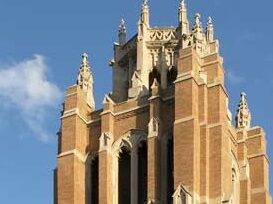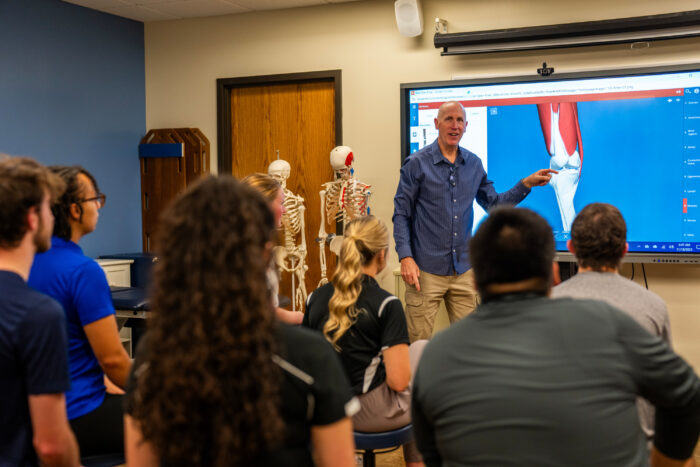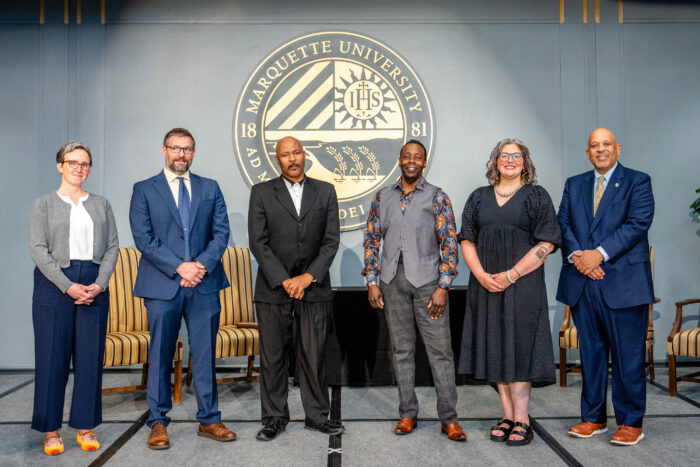Dear Marquette faculty and staff:
First, please accept my deepest gratitude for your service to Marquette University as we face the effects of a “triple pandemic” of three national crises hitting us all at once: a health crisis with the COVID-19 pandemic, an economic crisis and a racial justice crisis. These are critical times in our history that require changes on many fronts. The care and compassion you have shown for one another amid the stress and anxiety we are all feeling are appreciated. More than 250 individuals contributed more than $40,000 to the Employee Emergency Grant Fund for temporarily furloughed employees, and many people are signing up for the President’s Commission on Racial Equity. Our Catholic, Jesuit mission remains the bedrock of our university, with the Examen and prayer at the forefront of our decisions, now more than ever, as we confront the challenges before us.
Unfortunately, I am writing to you today to share some difficult news regarding our financial realities and the mitigating actions that we need to take in the upcoming year. In our COVID-19 Town Hall on June 10, we discussed the real and significant economic challenges that we face as a university. It is important to remember that we are not alone in these challenges. A recent New York Times op-ed titled “The End of College as We Knew It?” stated, “Colleges and universities are in trouble — serious trouble.” Macalester College President Brian Rosenberg is quoted in the op-ed saying, “If one were to invent a crisis uniquely and diabolically designed to undermine the foundations of traditional colleges and universities, it might look very much like the global pandemic.” Similarly, John Kroger, a visiting professor at Harvard Law School, recently wrote in Insider Higher Ed, “I expected many institutional closures before COVID-19. Now, I expect more than 750 to 1,000 universities to go under.” This is the sobering landscape in which we now find ourselves.
Following the June 1 deposit deadline for incoming students, our financial situation is now clearer. We must take action as a university to address our own revenue shortfalls and protect Marquette’s future. As we considered what potential actions to take as a campus, our principal goal was to keep everyone employed and to equitably have everyone do their part. In the end, after much consultation with leadership and groups on campus, the primary financial mitigation action that we have decided to take is temporarily suspending employer contributions to our retirement plan. While this letter is long, it provides additional context for how these decisions were made and details on our action plan.
Fiscal years 2020 and 2021 financial risks
Despite the creative and diligent efforts made by our Undergraduate Admissions team and many others across the university, Marquette stands at 16% below what we budgeted for our incoming first-year students, mainly due to the COVID-19 pandemic. It’s important to understand that this decline in freshman enrollment does not simply impact this year; rather, its effects will be sustained over the next four years. That is why we must take both short- and long-term risk mitigation steps.
The reduction in our incoming class, combined with ongoing expenses related to managing the effects of the COVID-19 pandemic, has implications for our budget and how we steward our valuable resources. As we shared in April, the COVID-19 pandemic resulted in a fiscal year 2020 budget shortfall of approximately $15 million, the majority of which was due to the $11 million cost to refund half a semester of room and board. At that time, we moved swiftly and decisively to cover that short-term loss through renegotiated vendor contracts, discretionary spending cuts, CARES Act relief funds and focused furloughs for employees whose work was diminished and for employees who could not perform their job duties remotely.
Looking ahead to fiscal year 2021, we have known financial risks of approximately $20 to 25 million. The actual number could be much higher and will depend on the final count for first-year students, attrition among our returning students, whether we are residential for part or all of the academic year, and the impact of other lost revenues, among other factors.
Our short-term risk mitigation plan for 2020–21
With the support of our Board of Trustees, we are enacting the following plan to address our known fiscal year 2021 budget risks as described above. We will continually assess our financial situation and may need to take additional actions based on how the academic year unfolds. It is our heartfelt hope that taking these steps now will allow us to continue to employ all our valued faculty and staff.
- Employer contributions to retirement plan suspended for 2020–21 fiscal year: The employer contribution to Marquette’s 403(b) retirement plan will be suspended for the 2020–21 fiscal year, which will amount to cost savings of approximately $10 million. This action begins July 1, 2020 and does not affect employees’ own contributions to their 403(b) retirement plans; employees may continue to contribute up to the federal maximum.
- University leadership salary reductions: The University Leadership Council, with the exception of the Academic and Staff Senate representatives, will take a 5% salary reduction for the 2020–21 fiscal year. ULC consists of approximately 35 university leaders, including all vice presidents, deans and vice provosts. Head Men’s Basketball Coach Steve Wojciechowski and Head Women’s Basketball Coach Megan Duffy have also volunteered to join their ULC colleagues in participating in this salary reduction. Provost Ah Yun and I have been taking salary reductions since April. The two of us and Senior Vice President and Chief Operating Officer Joel Pogodzinski have volunteered to take larger salary reductions that amount to 10% of our annual salaries.
- Merit increases canceled: As previously shared, faculty and staff merit increases for 2020–21 are canceled, resulting in cost savings of approximately $4 million.
- Discretionary spending reductions: We will reduce discretionary spending by 10% campuswide for the upcoming fiscal year, resulting in cost savings of approximately $6 million. This reduction includes expenditures that are not essential to teaching and supporting our students. Vice presidents, deans and vice provosts will be given targeted budget reductions for their respective areas. University travel by faculty and staff will be limited and must be approved by their representative on the University Leadership Council.
- Hiring: Nonessential hiring activities remain paused.
We will work with the custodial and police unions present on campus on the steps identified above.
In addition, a working group from across campus has been formed to assess the viability of initiatives that are not essential to our academic life, to the research and scholarship of our faculty, or to our Catholic, Jesuit mission. This opportunity will enable us to contemplate what truly defines Marquette and to sharpen our focus to those activities that fulfill our mission of faith, excellence, leadership and service. Expect more information on this in the coming months as we look ahead to create long-term sustainability for the university.
Given our known financial risks for the coming year, these are difficult but necessary steps that we must undertake together to preserve the future of Marquette. We all share in the tremendous responsibility of balancing cura personalis — care for the whole person, with cura apostolica — care for the work and the institution.
Planning for fall 2020
As we have shared publicly, Marquette intends to resume on-campus operations this fall if medical and government authorities deem it is safe to do so, and with the proper health and safety measures in place to help lessen the spread of the coronavirus. We have already adjusted the 2020–21 Academic Calendar to help mitigate the effects of a predicted second wave of the coronavirus this winter.
The campuswide Recovery Team is planning for a wide range of scenarios this fall, focusing on primarily in-person instruction with safeguards including smaller classes, some online instruction, the use of personal protective equipment, regular disinfection, symptom checking and physical distancing. We will have an academic instruction plan in place to pivot to distance learning at any point in the semester if necessary. Detailed information on the expectations and processes for our community as we undergo a phased return to campus is available on the Recovery tab of our COVID-19 website and will be updated this summer.
No matter what happens, it’s clear the fall 2020 semester will look and feel different than past semesters. We should all anticipate changes to how we interact with each other so that we may demonstrate care and concern for the most vulnerable among us and help limit the spread of the coronavirus.
This past semester was unlike any other in our history. Thank you for continuing to demonstrate the strength and resiliency of our Marquette family, even when we are separated. I am grateful for the privilege of working with you to educate our students and serve the greater glory of God.
May God bless each of you, your families and Marquette University.
Best,
Dr. Michael R. Lovell
President
Marquette University



